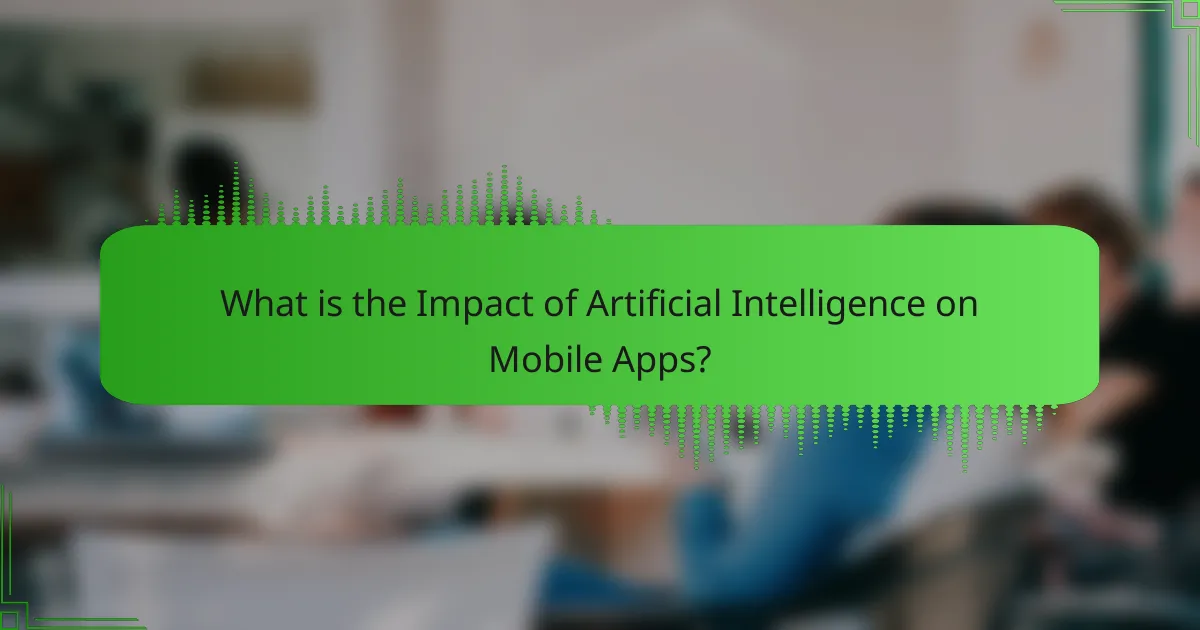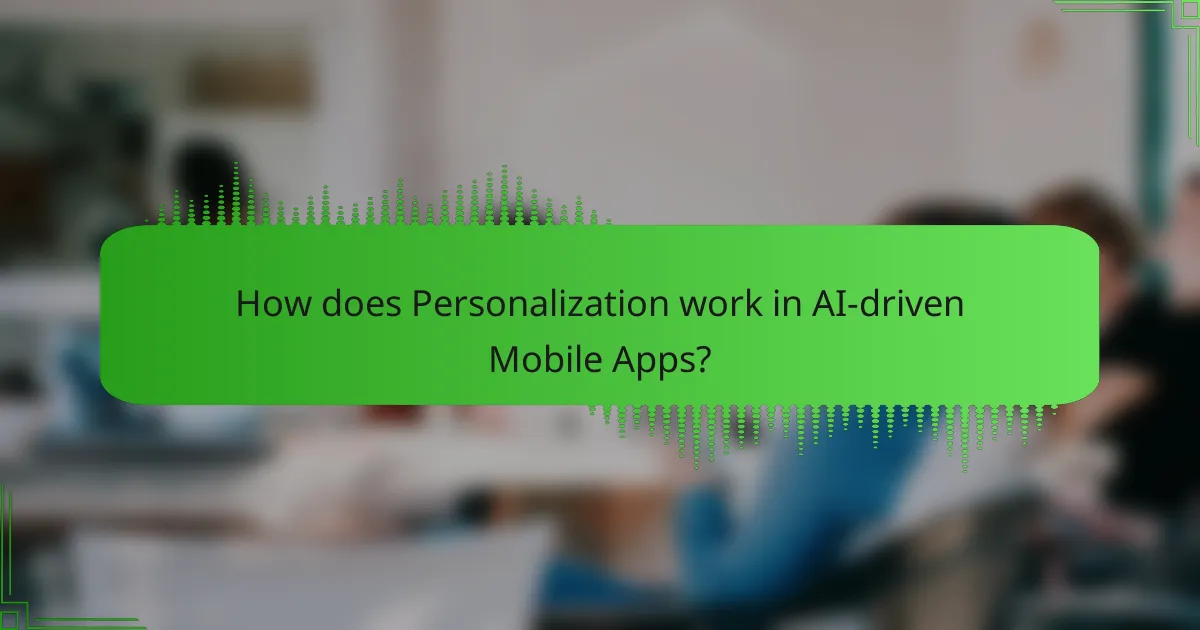Artificial Intelligence (AI) is transforming mobile applications through three primary components: personalization, automation, and analytics. Personalization utilizes AI algorithms to tailor user experiences based on individual behaviors and preferences, significantly enhancing engagement and satisfaction. Automation streamlines app processes, allowing for efficient task management and faster response times, while reducing manual intervention. Analytics provides crucial insights into user interactions and app performance, enabling developers to make informed decisions and optimize features. Together, these elements create more efficient, user-friendly, and data-driven mobile applications.

What is the Impact of Artificial Intelligence on Mobile Apps?
Artificial Intelligence significantly enhances mobile apps through personalization, automation, and analytics. Personalization allows apps to tailor experiences based on user behavior and preferences. For instance, AI algorithms analyze user data to recommend content or features. Automation streamlines processes, enabling apps to perform tasks without user intervention. This includes automated responses in customer service applications. Analytics powered by AI provides insights into user engagement and app performance. According to a report by Gartner, 80% of emerging technologies will have AI foundations by 2022. This indicates a strong trend towards integrating AI in mobile applications. Overall, AI transforms mobile apps into more efficient, user-friendly, and data-driven platforms.
How is Artificial Intelligence transforming mobile app development?
Artificial Intelligence is transforming mobile app development by enhancing personalization, automating processes, and improving analytics. AI algorithms analyze user data to deliver tailored experiences. This leads to increased user engagement and satisfaction. Automation powered by AI streamlines development tasks, reducing time and costs. For instance, AI can automate code generation and testing. Advanced analytics enabled by AI provides developers with insights into user behavior. This data-driven approach helps in making informed decisions for app improvements. According to a report by Gartner, AI-driven applications will significantly increase efficiency in mobile app development.
What are the key technologies driving AI in mobile apps?
Key technologies driving AI in mobile apps include machine learning, natural language processing, and computer vision. Machine learning enables apps to learn from user data and improve functionality over time. Natural language processing allows apps to understand and respond to human language. Computer vision facilitates image and video analysis, enhancing user interaction. These technologies collectively enhance personalization, automation, and analytics in mobile applications. For example, according to a report by Statista, the global AI market in mobile apps is projected to reach $190 billion by 2025, indicating significant growth and reliance on these technologies.
How do AI algorithms enhance user experience in mobile apps?
AI algorithms enhance user experience in mobile apps by personalizing content and improving functionality. They analyze user behavior and preferences to tailor recommendations. This leads to increased engagement and satisfaction. For example, Netflix uses AI to suggest shows based on viewing history. AI also automates customer support through chatbots, providing instant responses. This reduces wait times and enhances user convenience. Furthermore, AI algorithms analyze user data to identify trends and optimize app performance. According to a study by McKinsey, apps utilizing AI see a 20% increase in user retention. Overall, AI significantly improves user interaction and satisfaction in mobile applications.
What are the primary areas of impact for AI in mobile apps?
The primary areas of impact for AI in mobile apps are personalization, automation, and analytics. Personalization allows apps to tailor content and recommendations to individual user preferences. This enhances user engagement and satisfaction. Automation streamlines processes, enabling features like chatbots for customer support. This reduces response time and operational costs. Analytics leverages data to provide insights into user behavior. This helps developers make informed decisions for app improvements. AI thus significantly enhances functionality and user experience in mobile applications.
How does AI contribute to personalization in mobile applications?
AI enhances personalization in mobile applications by analyzing user data and behavior. It uses algorithms to tailor content and experiences to individual preferences. For example, AI can recommend products based on past purchases or suggest content aligned with user interests. Machine learning models continually improve recommendations as they learn from user interactions. According to a McKinsey report, 75% of consumers prefer personalized experiences. This shows that AI-driven personalization significantly impacts user engagement and satisfaction in mobile apps.
What role does automation play in the functionality of mobile apps?
Automation enhances the functionality of mobile apps by streamlining processes and improving user experience. It allows apps to perform tasks without human intervention. Automation can handle repetitive actions, such as data entry or notifications. This leads to increased efficiency and reduced errors. For instance, automated testing ensures apps function correctly before release. Additionally, automation enables personalized content delivery based on user behavior. According to a study by McKinsey, automation can improve productivity by up to 30%. Thus, automation is crucial for optimizing mobile app performance and user satisfaction.
How do analytics powered by AI improve app performance?
Analytics powered by AI improve app performance by providing data-driven insights that enhance user experience. AI analyzes user behavior patterns to identify areas for optimization. This leads to more personalized content and features tailored to user preferences. Real-time data processing allows for quick adjustments to app functionality. AI can predict user needs, facilitating proactive improvements. For instance, a study by McKinsey found that AI-driven analytics can increase app engagement by up to 30%. By leveraging these insights, developers can make informed decisions that boost overall app performance.

How does Personalization work in AI-driven Mobile Apps?
Personalization in AI-driven mobile apps tailors user experiences based on individual preferences and behaviors. AI algorithms analyze user data, such as interactions and feedback. This analysis helps create customized content, recommendations, and notifications. Machine learning models continuously learn from user behavior to improve personalization over time. For example, streaming services suggest shows based on viewing history. E-commerce apps recommend products based on past purchases and browsing patterns. Research shows that personalized experiences can increase user engagement by up to 80%. This data-driven approach enhances user satisfaction and retention in mobile applications.
What methods are used for personalizing user experiences?
Methods for personalizing user experiences include data analysis, user segmentation, and machine learning algorithms. Data analysis involves collecting and interpreting user data to identify preferences. User segmentation categorizes users based on behaviors and demographics. Machine learning algorithms predict user needs by analyzing past interactions. These methods enhance relevance and engagement in mobile apps. According to a report by McKinsey, personalized experiences can increase customer satisfaction by up to 20%.
How does user data influence personalization strategies?
User data significantly influences personalization strategies by providing insights into user preferences and behaviors. This data includes demographic information, browsing history, and interaction patterns. Analyzing this data allows companies to tailor content and recommendations to individual users. For instance, e-commerce platforms use purchase history to suggest products that align with a user’s interests. According to a study by McKinsey, personalized experiences can lead to a 10-30% increase in revenue. Additionally, user data helps in segmenting audiences for targeted marketing campaigns. This targeted approach enhances user engagement and satisfaction, leading to higher retention rates. Overall, leveraging user data is crucial for effective personalization strategies in mobile applications.
What are the benefits of personalized content in mobile apps?
Personalized content in mobile apps enhances user engagement and satisfaction. It tailors experiences based on individual preferences and behaviors. This customization leads to increased app usage and retention rates. Studies show that personalized experiences can improve conversion rates by up to 10%. Users are more likely to interact with content that resonates with their interests. Additionally, personalized content fosters a sense of connection between the user and the app. It can also drive higher customer loyalty and brand advocacy. Overall, personalized content significantly boosts the effectiveness of mobile apps.
What challenges do developers face in implementing personalization?
Developers face several challenges in implementing personalization. One major challenge is data privacy concerns. Regulations like GDPR impose strict guidelines on user data usage. Another challenge is the complexity of data integration. Developers must aggregate data from multiple sources, which can be technically demanding. Additionally, achieving accurate user segmentation is difficult. Misclassifying users can lead to ineffective personalization strategies.
Scalability is another challenge. As user bases grow, maintaining performance while delivering personalized experiences becomes harder. Moreover, developers often struggle with algorithm selection. The right algorithms are crucial for effective personalization but can be difficult to identify. Lastly, continuous user engagement is challenging. Users may change preferences, requiring constant updates to personalization strategies.
How can privacy concerns affect personalization efforts?
Privacy concerns can significantly hinder personalization efforts. When users fear their data is being misused, they are less likely to share personal information. This reluctance limits the data available for creating tailored experiences. A 2021 study by Pew Research Center found that 79% of Americans are concerned about how their data is used. Consequently, companies may struggle to deliver relevant content and recommendations. Additionally, stringent regulations like GDPR impose restrictions on data collection practices. These regulations further complicate the ability to personalize services effectively. Overall, privacy concerns lead to diminished user engagement and less effective personalization strategies.
What technical limitations exist in current personalization technologies?
Current personalization technologies face several technical limitations. One major limitation is data privacy concerns. Users are increasingly wary of sharing personal information. This leads to less data availability for personalization algorithms. Another limitation is the reliance on historical data. Personalization often fails to adapt to real-time changes in user behavior. Additionally, algorithm bias can skew personalization outcomes. This happens when algorithms are trained on unrepresentative data sets. Scalability is also a challenge. As user bases grow, maintaining performance and accuracy becomes difficult. Lastly, integration with existing systems can be complex. Many businesses struggle to implement personalization technologies effectively. These limitations hinder the full potential of personalization in mobile apps.

How does Automation enhance Mobile App Efficiency?
Automation enhances mobile app efficiency by streamlining processes and reducing manual intervention. It allows for faster response times and improved user experience. Automation can manage background tasks, such as data synchronization and updates, without user involvement. This leads to less downtime and smoother performance. Additionally, automated testing ensures that apps function correctly before deployment. According to a study by the International Journal of Mobile Computing and Multimedia Communications, automated testing can reduce testing time by up to 90%. Automation also enables real-time analytics, allowing developers to make data-driven decisions quickly. Overall, automation significantly optimizes resource allocation and operational workflows within mobile apps.
What tasks can be automated in mobile app processes?
Tasks that can be automated in mobile app processes include user onboarding, data entry, push notifications, and customer support. User onboarding can be streamlined through automated tutorials and guided tours. Data entry tasks, such as form filling and information updates, can be automated using AI algorithms. Push notifications can be scheduled and personalized based on user behavior without manual intervention. Customer support can utilize chatbots to handle common inquiries and provide instant responses. Automating these tasks enhances efficiency and improves user experience in mobile applications.
How does automation improve user engagement within apps?
Automation improves user engagement within apps by providing personalized experiences and timely interactions. Automated systems can analyze user behavior and preferences in real-time. This analysis allows apps to deliver tailored content and recommendations. For instance, 80% of users are more likely to engage with personalized experiences. Automation also facilitates timely notifications and reminders, keeping users informed and engaged. Research shows that apps utilizing automation can increase user retention by up to 30%. Additionally, automated customer support can enhance user satisfaction by providing immediate assistance. These factors collectively contribute to higher levels of user interaction and loyalty within applications.
What are the potential drawbacks of automation in mobile apps?
Potential drawbacks of automation in mobile apps include reduced user engagement and increased dependency on technology. Automation can lead to a lack of personalization, as automated responses may not meet specific user needs. This can result in frustration and decreased satisfaction. Furthermore, automation can introduce errors if the algorithms are not properly calibrated. Users may also experience privacy concerns, as automated systems often require access to personal data. Additionally, over-automation can make apps less intuitive, as users might struggle with automated features that do not align with their expectations. Overall, while automation offers efficiency, it can compromise user experience if not implemented thoughtfully.
How is automation evolving with advancements in AI?
Automation is evolving significantly due to advancements in AI. AI technologies enable more efficient processes by learning from data. Machine learning algorithms optimize tasks, making them faster and more accurate. Natural language processing enhances user interactions through chatbots and voice assistants. AI-driven automation reduces human error and operational costs. Predictive analytics allows for proactive decision-making in various industries. The integration of AI in automation leads to smarter systems that adapt over time. This evolution is reshaping workflows across sectors like healthcare, finance, and manufacturing.
What future trends in automation should developers anticipate?
Developers should anticipate increased integration of artificial intelligence in automation. AI will enhance decision-making processes and streamline workflows. Predictive analytics will enable proactive responses to user needs. Robotic process automation will reduce repetitive tasks across various industries. Low-code and no-code platforms will emerge, simplifying automation for non-developers. Enhanced data security measures will be essential as automation expands. Finally, automation will increasingly focus on sustainability, optimizing resource use and reducing waste. These trends are supported by ongoing advancements in machine learning and AI technologies.
How can developers leverage automation for better user retention?
Developers can leverage automation to enhance user retention by implementing personalized engagement strategies. Automation allows developers to send targeted notifications based on user behavior. These notifications can remind users about app features or suggest new content. For example, personalized messages can increase user interaction by up to 50%.
Additionally, automation can streamline onboarding processes. A well-automated onboarding experience can lead to a 30% increase in user retention over the first week. Developers can utilize automated feedback loops to gather user insights continuously. This data can inform future updates and improvements.
Moreover, automated customer support can enhance user satisfaction. Quick responses to user queries can significantly improve retention rates. Research shows that 70% of users prefer automated responses for immediate assistance. By integrating these automation strategies, developers can create a more engaging and user-friendly experience, ultimately driving higher retention rates.

What role do Analytics play in AI-driven Mobile Apps?
Analytics play a crucial role in AI-driven mobile apps by providing insights into user behavior and app performance. They help developers understand how users interact with the app. This data is essential for improving user experience. Analytics can identify patterns and trends in usage. For example, they can reveal which features are most popular. This information allows for targeted updates and enhancements. Furthermore, analytics support personalization by tailoring content to user preferences. They also enable predictive modeling to anticipate user needs. According to a study by Statista, companies leveraging analytics see a 10-20% increase in user engagement.
How do AI analytics differ from traditional analytics in mobile apps?
AI analytics utilize machine learning algorithms to analyze data in real-time, while traditional analytics rely on predefined metrics and historical data analysis. AI analytics can identify patterns and trends automatically, adapting to new data inputs without manual intervention. In contrast, traditional analytics often requires manual setup and adjustments to analyze changing data. AI analytics can provide predictive insights, forecasting user behavior based on historical data. Traditional analytics typically focuses on descriptive statistics, offering insights based on past events. Research indicates that companies using AI analytics can achieve up to 30% better decision-making speed compared to traditional methods. This difference highlights the enhanced adaptability and foresight of AI analytics in mobile app environments.
What types of data are most valuable for AI analytics?
Structured data, unstructured data, and semi-structured data are the most valuable for AI analytics. Structured data includes databases and spreadsheets, allowing for easy analysis. Unstructured data consists of text, images, and videos, which provide rich insights when processed. Semi-structured data, like JSON or XML files, combines elements of both. These data types enable AI algorithms to learn patterns and make predictions effectively. According to a study by McKinsey, companies that leverage data effectively can improve their profitability by 5-6%. Thus, the integration of diverse data types enhances the capabilities of AI analytics.
How can analytics inform app development and marketing strategies?
Analytics can significantly inform app development and marketing strategies by providing data-driven insights. These insights help identify user preferences and behaviors. For instance, analyzing user engagement metrics can reveal which features are most popular. This information allows developers to prioritize feature enhancements. In marketing, analytics can segment audiences based on usage patterns. Targeted campaigns can then be designed to address specific user needs. Furthermore, A/B testing results can guide decisions on app design and functionality. According to a report by Statista, 70% of companies say analytics has improved their marketing effectiveness. This demonstrates the tangible benefits of leveraging analytics for strategic decisions.
What are the best practices for utilizing analytics in mobile apps?
The best practices for utilizing analytics in mobile apps include defining clear objectives, selecting appropriate metrics, and implementing user segmentation. Clear objectives guide the analytics strategy. Metrics such as user engagement, retention rates, and conversion rates provide actionable insights. User segmentation allows for tailored experiences based on behavior and preferences. Regularly reviewing analytics data helps identify trends and areas for improvement. Integrating A/B testing can optimize features and user interfaces. Utilizing tools like Google Analytics or Firebase offers robust data collection capabilities. These practices enhance decision-making and improve user experience.
How can developers ensure data accuracy in analytics?
Developers can ensure data accuracy in analytics by implementing rigorous data validation processes. This includes defining clear data entry standards to minimize errors. Regular audits of data can help identify inconsistencies and inaccuracies. Utilizing automated tools for data cleaning can also enhance accuracy. Furthermore, employing real-time data monitoring allows for immediate detection of anomalies. Training staff on data handling best practices is essential for maintaining quality. According to a study by the Data Warehousing Institute, organizations can improve data accuracy by up to 50% with these methods.
What tools are recommended for effective AI-driven analytics?
Recommended tools for effective AI-driven analytics include Google Analytics, Tableau, and IBM Watson Analytics. Google Analytics provides comprehensive insights into user behavior and traffic patterns. Tableau offers powerful data visualization capabilities, enabling users to create interactive dashboards. IBM Watson Analytics utilizes machine learning to uncover trends and insights from data. These tools are widely recognized for their effectiveness in analyzing data and driving informed decision-making.
What practical tips can enhance the impact of AI on mobile apps?
Incorporating AI effectively in mobile apps requires several practical tips. First, utilize user data for personalized experiences. Personalization can increase user engagement by 30%. Second, implement machine learning algorithms for predictive analytics. This can enhance decision-making and improve user satisfaction. Third, automate customer support using AI chatbots. Chatbots can reduce response time by 70%. Fourth, ensure seamless integration of AI features. This maintains app performance and user experience. Lastly, continuously test and optimize AI features. Regular updates can lead to a 20% increase in user retention. These strategies collectively enhance the impact of AI on mobile apps.
The main entity of the article is Artificial Intelligence (AI) and its impact on mobile applications. The article explores how AI enhances mobile apps through personalization, automation, and analytics, leading to improved user experiences and operational efficiency. Key technologies such as machine learning, natural language processing, and computer vision are discussed, along with their roles in transforming app development and user engagement. Additionally, the article addresses the challenges developers face in implementing AI-driven personalization and automation, as well as the importance of leveraging analytics for informed decision-making in app development and marketing strategies.


